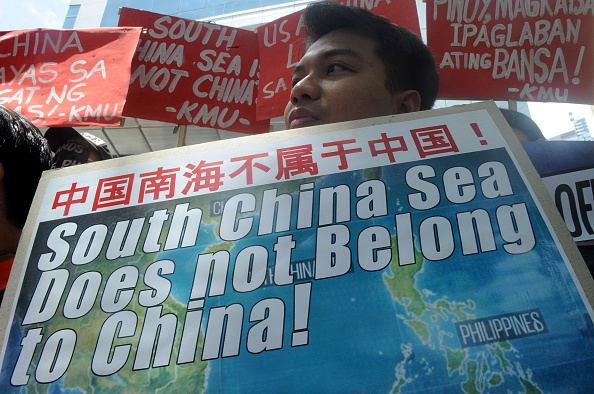China 'not frightened to fight a war with the U.S.' over South China Sea


A free daily email with the biggest news stories of the day – and the best features from TheWeek.com
You are now subscribed
Your newsletter sign-up was successful
In a direct challenge to China's territorial and maritime claims, on Tuesday the U.S. sailed a navy destroyer within 12 nautical miles of a cluster of artificial islands that China constructed in the South China Sea, known as the Spratly Archipelago. In response, Chinese media issued bristling editorials suggesting the nation wouldn't be afraid to fight back against U.S. aggression.
"In [the] face of U.S. harassment, Beijing should deal with Washington tactfully and prepare for the worst," one newspaper said, as reported by The Guardian. "This can convince the White House that China, despite its unwillingness, is not frightened to fight a war with the U.S. in the region, and is determined to safeguard its natural interests and dignity."
Another newspaper accused the U.S. of a pattern of kicking up trouble: "Cast-iron facts show that time and again the United States recklessly uses force and starts wars, stirring things up where once there was stability, causing the bitterest of harm to those countries directly involved."
The Week
Escape your echo chamber. Get the facts behind the news, plus analysis from multiple perspectives.

Sign up for The Week's Free Newsletters
From our morning news briefing to a weekly Good News Newsletter, get the best of The Week delivered directly to your inbox.
From our morning news briefing to a weekly Good News Newsletter, get the best of The Week delivered directly to your inbox.
"The United States has been very irresponsible. We will take any measures necessary to safeguard our security," Chinese defense spokesperson Yang Yujun was additionally quoted as saying.
U.S. Defense Secretary Ash Carter, however, has warned that the United States plans to take full advantage of its "freedom of navigation." "We will fly, sail, and operate wherever international law permits," Carter told a congressional hearing. More operations in the region are planned.
China's moves in the South China Sea rival claims by Vietnam, Malaysia, Brunei, the Philippines, and Taiwan. The islands, which used to be submerged during high tide, have been built up by China supposedly for civilian purposes, but also host three military-length airstrips. The United States believes the islands are in international waters and China's claim threatens busy trade routes through the region.
A free daily email with the biggest news stories of the day – and the best features from TheWeek.com
Jeva Lange was the executive editor at TheWeek.com. She formerly served as The Week's deputy editor and culture critic. She is also a contributor to Screen Slate, and her writing has appeared in The New York Daily News, The Awl, Vice, and Gothamist, among other publications. Jeva lives in New York City. Follow her on Twitter.
-
 History-making moments of Super Bowl halftime shows past
History-making moments of Super Bowl halftime shows pastin depth From Prince to Gloria Estefan, the shows have been filled with memorable events
-
 The Washington Post is reshaping its newsroom by laying off hundreds
The Washington Post is reshaping its newsroom by laying off hundredsIn the Spotlight More than 300 journalists were reportedly let go
-
 Quiet divorces are sneaking up on older couples
Quiet divorces are sneaking up on older couplesThe explainer Checking out; not blowing up
-
 Nobody seems surprised Wagner's Prigozhin died under suspicious circumstances
Nobody seems surprised Wagner's Prigozhin died under suspicious circumstancesSpeed Read
-
 Western mountain climbers allegedly left Pakistani porter to die on K2
Western mountain climbers allegedly left Pakistani porter to die on K2Speed Read
-
 'Circular saw blades' divide controversial Rio Grande buoys installed by Texas governor
'Circular saw blades' divide controversial Rio Grande buoys installed by Texas governorSpeed Read
-
 Los Angeles city workers stage 1-day walkout over labor conditions
Los Angeles city workers stage 1-day walkout over labor conditionsSpeed Read
-
 Mega Millions jackpot climbs to an estimated $1.55 billion
Mega Millions jackpot climbs to an estimated $1.55 billionSpeed Read
-
 Bangladesh dealing with worst dengue fever outbreak on record
Bangladesh dealing with worst dengue fever outbreak on recordSpeed Read
-
 Glacial outburst flooding in Juneau destroys homes
Glacial outburst flooding in Juneau destroys homesSpeed Read
-
 Scotland seeking 'monster hunters' to search for fabled Loch Ness creature
Scotland seeking 'monster hunters' to search for fabled Loch Ness creatureSpeed Read
